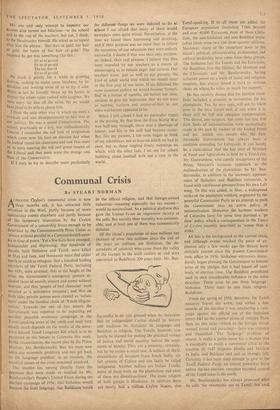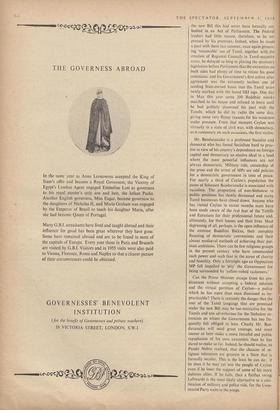Communal Crisis
By STUART NORMAN
Au-Howl-I Ceylon's communal crisis is now
A
three months old, it has attracted little attention in the Weit, partly because of more spectacular events elsewhere and partly because of the temporary imposition by the Ceylon Government of a censorship fierce enough to be described by the Commonwealth Press Union as 'almost without parallel in a Commonwealth coun- try in time of peace.' Yet a few facts have emerged, Indisputable and depressing; that hundreds of People, both Sinhalese and Tamil, were killed In May and June, and thousands more fled either north or south as refugees; that a hundred leading Members of the Tamil Federal Party, including ten MPs, were arrested; that at the height of the crisis the Government's emergency powers in- cluded those of search, seizure and arrest without warrant, and that 'people of bad character' were arrested as 'a preventive measure'; and that on both sides private armies were created as 'volun- teers' under the familiar cloak of 'Youth Organi- sation.' Towards the end of last month the Government was reported to be expecting yet another peaceful resistance campaign in the Tamil-speaking areas of the north and east; very clearly much depends on the results of the some- what belated Tamil Language Bill which is to be presented to the Senate in Colombo this week, In the circumstances, the recent plea by the Prime Minister, Mr. Bandaranaike, that 'we must now solve our economic problems and not get back to the language problem' is an evasion; the essential causes of the crisis remained unsolved.
The trouble has sprung directly from the promises that were made or implied by Mr. Bandaranaike's People's United Front during the election campaign of 1956; that Sinhalese would become the State language, that Buddhism would be the official religion, and that foreign-owned industries—meaning especially the tea estates— would be nationalised. As a political platform this gave the United Front an impressive victory at the polls. But socially their morality was question- able; and at least one of them was economically dubious.
Of the island's population of nine millions (an increase of over two millions since the end of the war) six millions are Sinhalese, the de- scendants of colonists who came from the valley of the Ganges in the sixth century BC and were converted to Buddhism 200 years later. Mr. Ban- daranaike is on safe ground when he maintains that an independent Ceylon should by history and tradition be Sinhalese in language and Buddhist in religion. The 'Tamils, however, .can hardly be blamed for putting the practical virtues of justice and social equality before the argu- ments of history. They are a minority, certainly, but by no means a small one. A million of them, descendants- of invaders from South India, are full citizens of Ceylon and can fairly be called indigenous. Another million are Indian Tamils; many of these work on the plantations and most of them are disenfranchised. The main religion of both groups is Hinduism. In addition there are nearly half a million Ceylon Moors, also Tamil-speaking. If to all these are added the European population (including 7,000 British) and over 40,000 Eurasians, Most of them Chris- tians, the non-Sinhalese and non-Buddhist popu- lation totals some two and three-quarter millions. Moreover, many of the important posts in the island's political, adMinistratiVe, professional and cultural leadership have come from these groups. The Sinhalese fear the Tamils and the Eurasians; the Buddhists fear the Hindus, the Moslems and the Christians; and ,Mr. Bandaranaike, having achieved power on a wave of racial and religious emotion, has always found it hard to restrain those on whom he relies so much for support.
He has recently denied that his election mani- festo included a promise to nationalise the tea plantations. Tea, he now says,.will not be taken over in the near future and, if and when it is, there will be full and adequate compensation.
This denial, one suspects, has come too late. For dark hints of nationalisation were undoubtedly made in the past by leaders•of the United Front and are, indeed, one reason why the Ban- daranaike GovernMent has always been a coalition extending far Leftwards. It can hardly be a coincidence that the key post of Minister of Food and Agriculture is held by a Trotskyite, Mr. Gunwardene, who openly disapproves of the Prime Minister's cautious approach to the nationalisation of the plantations. So Mr. Ban- daranaike, in addition to the necessary appease- ment of Sinhalese and Buddhist extremists, is faced with continuous pressure from his own Left wing. To this was added, in.May, a widespread strike of the plantation workers, organised by the powerful Communist Party as an attempt to push the Government into an active policy of nationalisation. Moreover the harbour workers of Colombo have for some time pursued a 'go slow' policy which a correspondent in the Times of Ceylon recently described as 'worse than a strike.'
All this is the background to the current crisis, and although events reached the point of ex- , plosion only a few weeks ago .the threats have certainly existed since the present Government took office in 1956. Sinhalese extremists imme- diately began pressing the Government to honour some of the pledges that it had tossed off care- lessly at election time. The Buddhist priesthood used its own considerable influence in the same direction. There must be one State language: Sinhalese. There must be one State religion : Buddhism.
Froth the spring of 1956, therefore, the Tamil minority feared the worst, and within a few months of the election it was conducting a cam paign against the official use of the Sinhalese letters SRI on the number plates of vehicles. Even then, on this issue—which to the foreign visitor seemed trivial and parochial—there was violence and bloodshed. The 'language' problem, of course, is really a polite name for a dispute that is essentially as much a communal affair as the troubles in 1947 between Hindu and Moslem in India and Pakistan and just as strongly felt. Certainly it has been deep enough to give to the Tamil Federal Party, an almost powerless force before the last election; complete electoral control of the Tamil areas in the north. • Mr. Bandaranaike has always promised what he calls 'the reasonable use of Tamil,' but until the new Bill this had never been formally em- bodied in an. Act of Parliament. The Federal leaders had little reason, therefore, to be im- pressed by his promises. Indeed, when he made a pact with them last summer, once again promis- ing 'reasonable' use of. Tamil, together with the creation of Regional Councils in Tamil-majority areas, he delayed so long in placing the necessary legislation before Parliament that the extremists on both sides had plenty of time to vitiate his good intentions; and his Government's first action after agreement was the extremely tactless one of sending State-owned buses into the Tamil areas newly marked with the hated SRI sign. One day in May this year some 200 Buddhist monks marched to his house and refused to leave until he had publicly disowned his pact with the Tamils; which he did by radio the same day, giving some very flimsy reasons for his weakness under pressure. From that moment Ceylon was virtually in a state of civil war, with democracy, as is customary on such occasions, the first victim.
Mr. Bandaranaike is a professed Socialist and democrat who has found Socialism hard to prac- tise in view of his country's dependence on foreign capital and democracy an elusive ideal in a land where the most powerful influences are not always democratic. Military rule, censorship of the press and the arrest of MPs are odd policies for a democratic government in time of peace. For nearly a third of Ceylon's population the name of Solomon Bandaranaike is associated with racialism. The proportion of non-Sinhalese in public positions has slowly decreased and many Tamil businesses have closed down. Anyone who has visited Ceylon in recent months must have been made aware of the reai fear of the Tatnils and Eurasians for their professional future and, ultimately, for their homes and their lives. Most depressing of all, perhaps, is the open influence of the extreme Buddhist Bikkus, their complete flaunting of democratic conventions and their almos" t medimval methods of achieving their par- tisan ambitions. There can be few religious groups in the present century who have commanded such power and such fear in the name of charity and humility. Only a fortnight ago an Opposition MP felt impelled to 'pity' the Government for being surrounded by 'yellow-robed racketeers.'
Can the Prime Minister escape from his pre- dicament without accepting a federal solution and the virtual partition of Ceylon—a policy which he has more than once dismissed as im- practicable? There is certainly the danger that the uses of the Tamil language that are promised under the new Bill may be too restrictive for the Tamils and too adventurous for the Sinhalese ex- tremists on whom the Government has too fre- quently felt obliged to lean. Clearly Mr. Ban- daranaike will need great courage, and must sooner or later make a more forceful and public repudiation of his own extremists than he has dared to make so far. Indeed, he should realise, as Pandit Nehru realised, that the chances of re- ligious toleration are greatest in a State that is formally secular. This is the least he can do : if he does it he may yet win the people of Ceylon even if he loses the support of some of his more dubious allies. If he fails, then a further swing Leftwards is the most likely alternative to a con- tinution of military and police rule, for the Com- munist Party waits in the wings.



































 Previous page
Previous page